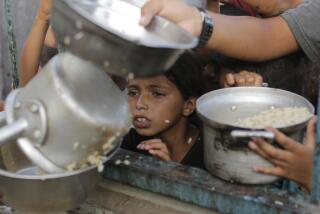Western Aid Begins Reaching Iraq’s Kurdish Refugees : Relief: The tide has turned, officials say, after logistical problems delayed delivery of food, tents and clothing.
- Share via
ISTANBUL, Turkey — One of the world’s biggest relief efforts has finally begun gaining momentum on the rugged Turkish-Iraqi frontier, in the belated rush to help about 400,000 cold and hungry Kurdish refugees, international relief officials said Thursday.
As freezing rain and snow lashed the refugees for the third straight day, helicopters from the United States and other Western nations flew in supplies after aid-laden trucks became stuck in the mountain roads near the 200-mile-long frontier.
“I don’t think we’ve ever had this large a population flee in such a short period,” said Daniel Conway, the Ankara, Turkey, representative of the Office of U.N. High Commissioner for Refugees and coordinator of non-military foreign relief operations.
“The basic problem is logistics,” Conway said in a telephone interview. “(The refugees) are in one of the most inaccessible areas of the world, high in the mountains, scattered, out of reach. The roads are just traps for trucks.”
The Kurds, who tried to capitalize on Iraqi President Saddam Hussein’s defeat by the allied military coalition in the Persian Gulf War, began fleeing northward toward Turkey last month when it became clear that their rebellion was failing. But the first foreign aid did not reach any of them until Tuesday. Relief officials say none has arrived yet in most holding areas, although military aircraft from the United States and other Western nations have been dropping food and shelter materials by parachute.
The magnitude of the crisis dwarfed initial assistance efforts. At first, Turkish officials said 250,000 refugees were on the border, but they raised the estimate to 400,000 on Thursday.
In addition to the refugees along the Turkish border, about twice as many--as many as 900,000--are thought to be clustered along the Iraqi border with Iran after failed rebellions by Shiite Muslims in the south and the Kurds in the north triggered Hussein’s vengeance. Iran has let masses of them into the country, but Turkey, fearing the consequences of allowing such numbers to enter, has kept its border closed while trying to help the Kurds with cross-border aid.
Turkish State Minister Kamran Inan said 2,000 have died since the refugees started pressing against the Turkish border 10 days ago.
On the eastern half of the Turkish-Iraqi border, provincial Gov. Sehabettin Harput said that only 20,000 of 300,000 blankets needed had been distributed among refugees, who are surviving on one loaf of bread shared by four people a day. He said that 100 tons of bread are needed but that only a tenth of that has been distributed, about 30,000 loaves each day.
Harput said that any aid that had reached the refugees was the result of local efforts by Turkish Kurds, who provided 200 trucks carrying 2,000 tons of supplies to the refugees.
Now the tide is changing, relief officials say. In Ankara, the U.S. Embassy said Thursday that 130,000 blankets, 1,300 tents and 89,000 cases of military “meals ready to eat” had been taken from disaster-contingency stockpiles in Europe for use in the relief effort. More food, tents, blankets and clothing are en route from the United States.
The United Nations has launched a $500-million appeal for refugees in Iran, Turkey and Iraq. The European Community has pledged by far the largest single relief contribution, $185 million.
Among private groups rushing help, Britain’s Save the Children said it will buy Turkish food for local distribution. The Oxfam agency will secure clean water; some refugees are drinking melted snow laced with “black rain” from Kuwait’s burning oil fields.
Twenty-one planeloads of foreign aid arrived between last Friday and Wednesday, the Turkish Foreign Ministry said. Now up to 10 planes arrive each day from all over the world, sometimes having to land in Ankara because of overcrowding at Diyarbakir Airport, the main gateway to southeastern Turkey.
Forwarding of initial supplies last weekend by road worked well, according to the French Red Cross. But German sources said by midweek that 50 aid trucks were stuck in axle-deep mud on approach roads to the two main refugee holding areas, near the Turkish border towns of Cukurca and Uludere.
To overcome these problems, diplomats said, helicopters were being rushed to Turkey, including 30 U.S. medium- and heavy-lift models, a handful of German copters and three British Chinooks.
Farther inside Iraq, U.S. planes have already parachuted in 150 tons of tents, blankets and food. Five French planes continue to drop 30 tons a day. With the British effort as well, diplomats soon expect the daily drop over Iraq to reach 100 tons per day.
Although Turkey says the number of refugees is rising, local reports say a few hundred have headed back to test an amnesty that Hussein offered this week. Most of them appear to be Assyrian Christians, not Kurds, who make up the majority of the refugees.
On Wednesday, mothers crowded at the border with their babies wrapped in rain-sodden blankets, begging Turkish troops to allow them past to seek medical treatment. Witnesses said the soldiers beat the refugees back with rifle butts, then fired into the air.
More to Read
Sign up for Essential California
The most important California stories and recommendations in your inbox every morning.
You may occasionally receive promotional content from the Los Angeles Times.










